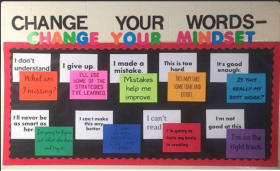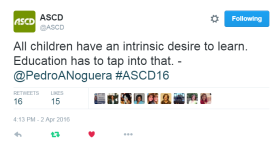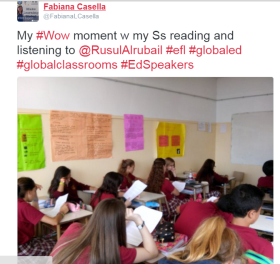I recently listened to
Vicki Davis´ talk with
Ron Clark in “Every Classroom Matters”, on BAM radio network, about
methods to reach the hard-to-reach students. How does this connect with “keeping students motivation alive?. I will try to make a difference between the conversation between Mrs Davis and Mr Clark had in which they described so clearly -I could almost see the expressions on their faces despite the fact it was a radio show- the effort that teachers have to make to engage a whole class in certain activities or topics. In my opinion engagement has to do with motivation, whether intrinsic or extrinsic, both co-exist among a school population. I would like to understand that one type of motivation is intrinsic to the person itself or the so called self-motivation, whereas the extrinsic one is the one caused by the educator´s magical touch or the student´s desire to achieve a goal or get something special. I could name another type of motivation which is not motivation itself, but it´s the child´s knowing that at school he has to complete assignments, it is part of his life as a child or as a teenager. Yes! Believe it or not, some students function like that!. I am a real witness of several types of students´ functionality. Ron Clark made a point when he said that children should not be given a trophy to show them they are great. (I am not so sure about this because my own child used to read a great number of books from the library to get a coupon to eat at Pizza Hut or Subway, which helped him not only to be fluent in English in less than a year, but also to be Advanced Reader when he was six). Ron Clark also
added that that was something he had seen for years: parents claiming a prize or trophy was typical of “our society”, he meant the American one: parents demanding teachers to treat their children as if they were champions in everything they do. Mr Clark states “We, Americans, are raising kids who cannot take a “No” for an answer”. I only wish I could tell him it is not only in the U.S. where this happens: it is a worldwide problem. To make matters worse, what I also see really negative in all that is that children cannot take orders or instructions easily or understand when something is not right and should not be done.
As an educator who has worked in a private school in Argentina, my native land, since the late ´80´s and for North Carolina Public School System from 2001 to 2008, I not only know exactly how the system works but also how students behave in both environments. I personally think some children are spoiled by their parents, I was once told while working in the US… Spoiled??, I wondered …Yes! I first heard that word while working at ERHS and did not understand what it meant very much at the beginning, but later I realized what that sweet secretary wanted to tell me: Señora Casella, that is how she would call me, “in America”, she said, “our children are spoiled”, she would add: “parents give fancy cars to children when they are 15 or 16, they get any electronic device easily, the last video game or whatever t-shirt, pair of pants on fashion”. I felt so puzzled and more did she until I told her, she was totally unaware that almost the same happens here with middle-class children, tweens and teenagers, or at least in Buenos Aires, the capital city, where I live: to my amazement, about a month ago I saw a mom walking her toddler on a stroller and the baby was playing with an ipad!. I remember I got very upset when a student of mine, back in the 1990´s was given a brand new car even though he had not graduated from school: he never studied for the easy tests I used to give that class!. The truth was that I was almost thirty but I couldn´t afford a car of my own in those times!. I was not envious I was upset.
Anyway, I believe, like many of the awesome teachers in my PLN, we all have a talent and we deserve to be acknowledge for that talent. I´m not saying every time a child does something well needs to be given a gift, aka trophy. This is the kind of message, I understand, Ron Clark wants to deliver: in a way what he says is that children need to understand that sometimes they are better or not that good than others at doing something, that they need to face reality from childhood, because they will grow thinking they deserve a trophy for every good deed, but what the point is that their good actions DO need to be addressed as GOOD and well-accomplished without over-reacting or “over-awarding” them.
 |
| Image credit Edutopia-Mary Williams-Educator |
In my opinion, what truly matters is how much effort and enthusiasm students put in what they do. I strongly believe all students can learn, and it is true that some of them learn sometimes at a different pace, but in the end, we all deserve to see the result of an effort: I love to enhance the I CAN and “I am going to get it”, so I am sharing this screenshot from a fantastic webinar given by Susan Hillyard in November 2015.
Going From I Can´t To I Can! by Susan Hillyard.:
 |
| Image credit Susan Hillyard |
As a caring educator and mother myself, I need to express my disagreement with certain attitudes and decisions some teachers make, especially with self-motivated students. I have met self-motivated children who participated actively in class, finished classwork really quickly and were always ready to write on the board, answer questions, volunteer or do whatever task I proposed. Unfortunately, sometimes this type of students are those seeking perfection and feel really frustrated when they can´t get to the level they are expecting to achieve. I have found this wonderful, very useful chart on Change Your Words-Change Your Mindset, which applies to those children who try to do their best, but still can´t fully succeed, the same way those who try their best, get it and when they do not, they feel fully accomplished.
 |
| Image credit Pinterest-Growth Mindset Board |
Going back to Mr Clark´s opinion on giving a trophy to every student, in my opinion, an it could be an alternative to that method, what teachers CAN do, and now addressing a colleague, (whose name will be kept anonymous because he/she was not able to deliver a good message properly along the year) is give just a simple word of encouragement, a personal note to the pupil, or some kind of reward or praise: a thumbs up stamp or smiley face would have worked wonderfully. The praise and words of encouragement, which were used all along the year according to this above mentioned “educator”, were almost never effective in this second grade. And I am talking about second graders!. These methods did not reach most the class, quite the opposite, they encouraged misbehavior. I am not criticizing a colleague, I am intending to evaluate the educator´s role and point out the negatively increasing level of frustration this educator caused in most of the students, especially in those students who are faithful, good followers and allies of the teacher´s instructions. Honestly, what worries me most is that this person denied all feedback given by parents and was totally backed-up by the administrators. We, teachers cannot definitely lose students who are already intrinsically motivated!!

 |
| Image credit Education Week Teacher |
What is the consequence of all this? What is the worst outcome of all this lack of classroom management? It is a fact that good students get disappointed, lose motivation or any passion for learning, whereas those that do not care much about studying, have a great time doing what they want to do: nothing at all. One of the solutions to these type of problems is what Ron and Vicki suggest in the interview: if we give all students the same type of praise or message, we are capitalizing or socializing the classroom, children will no longer believe in us, because we tell the same to everybody.
 |
Image credit Fabiana Casella created with Quozio
via Edutopia-Maurice Elías |
It goes without saying that we, educators, cannot do what our students want us to do or say, but we have to have the perception, that one thing or sixth sense of who is who in our class, or what to tell who under certain circumstances, or who does what or does not: if we cannot figure out that “thing” after a couple of months, we are definitely not in the right job, for example: not to allow the whole class have recess or not finish reading a book at the library because some students are misbehaving is not fair to all students in that class. I would not want to be reprimanded like that if some other teachers do not do their work: whatever order or instruction authorities give should be directed to that specific people and not to the whole group: it causes disengagement, frustration, bad mood anddiscomfort.
 |
| Image credit Fabiana Casella created with Quozio via Edutopia-Maurice Elías |
We, teachers, have to work hard on
classroom management, set rules from the beginning of the school year, and be flexible enough to adapt those rules to certain moments or situations.
Showing you care is so easy, the difficult task is
keeping your energy until the very last minute of class to be able to achieve our goal: to reach at least one difficult student!. (Vicki Davis-Ron Clark)










